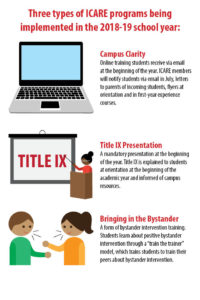
ICARE members working on sexual assault prevention training, programming for next academic year
The multi-faceted ICARE team is developing and planning new programs which will take effect in the fall, continuing the team’s mission to educate USD students on sexual assault prevention and response efforts.
ICARE members are working on two projects: developing a bystander intervention training called Bringing in the Bystander, and finding a way to make Campus Clarity, the online Title IX training students receive via email at the beginning of the academic year, mandatory for students.
Marisa Cummings, ICARE program coordinator, said in an email with The Volante that the Bringing in the Bystander training is still being discussed in prevention and education meetings. She said they’re still putting the finishing touches on the training, which will be completed in June and launch in the fall semester.
“ICARE will allow for more layers of sexual assault prevention and education across campus. This means that students will receive the sexual assault prevention and education messages in multiple ways and in multiple areas across campus,” Cummings said. “All of these strategies are equally important for our students’ safety and success at the University of South Dakota.”
Bringing in the Bystander
“Training the trainer” is the model of the bystander intervention training which will be implemented on campus in fall. This method of training students to train their peers was strategically selected and approved by the Office of Violence Against Women as best practice, Cummings said.
“Students naturally respond to their peers more than they do an administrator so that’s also why we chose that method,” she said.
Cummings said specific dates for this training will be available on the university calendar by July.
“We are very excited to see this program be successful with full implementation of the train the trainer model. We have had so many faculty, staff and student organizations come forward ready to participate,” she said.
Programming
Along with Bringing in the Bystander, ICARE plans to implement the Campus Clarity training next fall.
Cummings said the prevention and education subcommittee has been working collaboratively with Fast Track and Student Services in order to increase information and reach more students early on regarding the Campus Clarity online training.
“Student Services will be sending out an email to all first-year incoming students to notify them of the Campus Clarity online training in July,” she said. “A letter will also be sent out to all parents of incoming students to notify them of the Campus Clarity training.”
Cummings said she’s working with First-Year Experience courses to make Campus Clarity part of a class requirement, which would reach two-thirds of the incoming student population.
In addition to the new programs, she said there will be more “red zone” training next fall.
“The red zone is the first three months of classes when the most sexual assault occurs on campuses,” she said.
While ICARE has been working diligently to implement the new programs, Cummings said the Title IX presentation at the beginning of the academic year will still take place for first-year students.

Student engagement
Josh Sorbe, Student Government Association President, said SGA was a big part of promotion efforts for the official launch of ICARE in January.
“The SGA president sits on the ICARE programming committee, so I make sure to continue promoting ICARE and share the various program opportunities for students,” Sorbe said. “We shared it on our social media pages and encouraged our senators to reach out to other students by getting people involved in ICARE.”
Sorbe said the “What We Were Wearing” Exhibit hosted by PAVE and ICARE on the second floor of I.D. Weeks Library throughout the month of April is a great promotional display to get students more involved with ICARE.
“Students are inherently really interested in what ICARE is doing and keeping the conversation going about the importance of sexual assault prevention and awareness is vital moving forward,” he said.
Although Sorbe recognizes the tremendous progress with student involvement, he said continuing the conversation for this issue is an important challenge.
“Continuing to expose the student body on this very meaningful and substantive conversation is an ongoing challenge that’s extremely important for the safety of USD,” Sorbe said.
Mekko Bearkiller, a junior social work major, said he respects what ICARE represents for USD. He first got involved in ICARE’s awareness efforts through a class project, which included making pamphlets and a photography project of awareness posters.
“From a cultural perspective, ICARE helps Native American women and all women in general to speak out about any trauma or assault they’ve experienced,” Bearkiller said. “It’s a very good program that gives women a voice.”
Cummings said student involvement will be a key part moving forward with the new programming set to kick off in the fall semester.
“The student turn out has been high and we are also seeing a high level of engagement,” she said. “Engaging students in program development and implementation is very important.”


